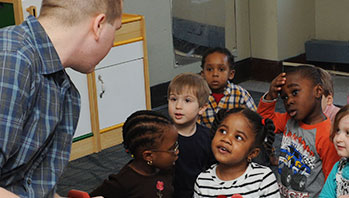- tape recorder
- higher
- listen
- lower
- sound
MA Standards:
Speaking and Listening/SL.PK.MA.1: Participate in collaborative conversations with diverse partners during daily routines and play.
Language/L.PK.MA.1: Demonstrate use of oral language in informal everyday activities.
Head Start Outcomes:
Language Development/Receptive Language: Attends to language during conversations, songs, stories, or other learning experiences.
Language Development/Expressive Language: Uses language to express ideas and needs.
Social Emotional Development/Self-Concept and Self-Efficacy: Identifies personal characteristics, preferences, thoughts, and feelings.
PreK Learning Guidelines:
English Language Arts/Language 2: Participate actively in discussions, listen to the ideas of others, and ask and answer relevant questions.
Science and Technology/Living Things and Their Environment 15: Use their senses of sight, hearing, touch, smell, and taste to explore their environment using sensory vocabulary.
Talk Together: Changing Our Voices

© Commonwealth of Massachusetts, Department of Early Education and Care (Jennifer Waddell photographer). All rights reserved.
STEM Key Concepts: Sounds have a source; Sounds vary in three ways: volume, pitch, and timbre
ELA Focus Skills: Speaking and Listening, Vocabulary
- Raise and lower your pitch as you say, Some voices sound higher than others. Some voices sound lower than others.
- Then ask children to share other ways they have made different sounds with their voices.
Practice by having children say their names, one after another. Say, Listen carefully for how each of our voices is a little different from all the others. Ask questions such as,
- Can you describe how my voice is different from Cindy's voice?
- Did you notice how Michael's voice is really low? How is that different from Chantelle’s?
After children have identified and shared differences in tone and pitch, record each child saying “I am <age> years old. I like to <sing>.”
Social Emotional Tip: Take the time to acknowledge that the difference in a person's voice is something to value. Ask children why they think it might be important to appreciate the differences in each other’s voices.
